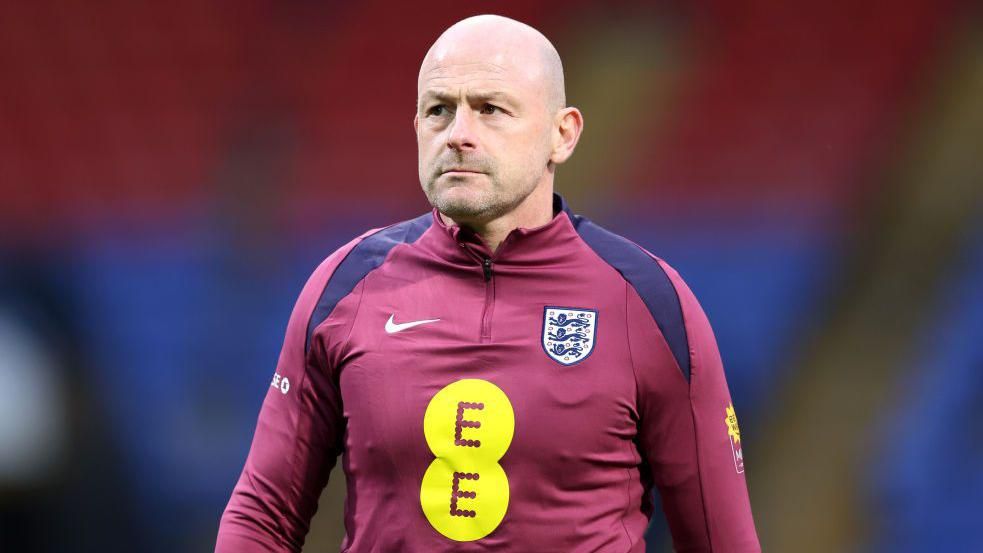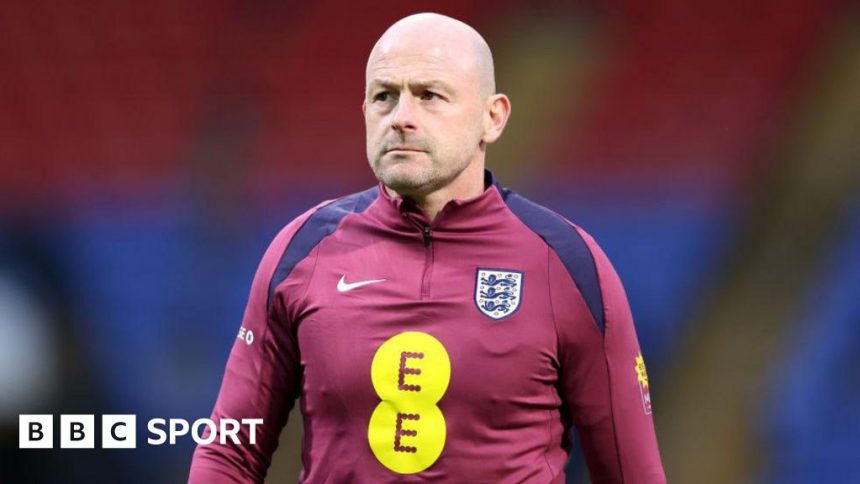Carsley and the British national anthem – explained

Lee Carsley played 40 times for the Republic of Ireland
-
Published
Lee Carsley’s explanation of why he will not sing the British national anthem before his first match in charge as England’s interim manager has provoked debate.
The 50-year-old, who was born in England but earned 40 caps for the Republic of Ireland during his playing career, was placed in temporary charge of the Three Lions in August following Gareth Southgate’s resignation.
Carsley’s tenure as interim manager begins against the country he represented as a player when England face the Republic of Ireland in Dublin in the Nations League on Saturday.
What did Carsley say?
The former Everton midfielder says he did not sing the Irish national anthem as a player or the British national anthem when he was in charge of England U21s because he was focused on the match ahead.
“This is something that I always struggled with when I was playing for Ireland,” said Carsley.
“The gap between your warm-up, your coming on to the pitch and the delay with the anthems. So it’s something that I have never done.
“I was always really focused on the game and my first actions of the game. I really found that in that period I was wary about my mind wandering off.
“I was really focused on the football and I have taken that into coaching. We had the national anthem with the Under-21s also and I am in a zone at that point. I am thinking about how the opposition are going to set up and our first actions within the game.
“I fully respect both anthems and understand how much they mean to both countries. It’s something I am really respectful of.”
Do England players sing the national anthem?
At Euro 2024, every one of England’s starting XI throughout the tournament sang God Save the King.
However, this has not always been the case.
In 2022, Liverpool’s Trent Alexander-Arnold was criticised by some for failing to sing the national anthem before a Nations League defeat by Hungary in Budapest.
Former England captain Wayne Rooney often did not sing the national anthem, particularly before he was given the armband.
The Football Association backed Rooney’s decision.
“Whether a player wishes to sing the national anthem or not is purely a personal choice,” an FA spokesperson said in 2012.
But former Manchester United captain Gary Neville says he chose not to sing the national anthem because he was told he “must” sing it by former FA chairman Geoff Thompson in 1995. , external
“I didn’t sing it the first time I played for England,” said Neville.
“Partly because I thought, I’m serious about my work and I’m not singing before a game.
“He [Thompson] only ever sought out one conversation with me.
“Did he want to pick my brains on World Cup preparation? Or ask how the FA could help behind the scenes? No, Mr Thompson wanted to know why I didn’t sing the National Anthem.
“I’m not being told by some suits what to do.”
What about previous England managers?
Southgate, Carsley’s predecessor, was a passionate singer of the national anthem both as a player and as a manager.
Previously, Roy Hodgson and Sam Allardyce both sang God Save the Queen.
Sven-Goran Eriksson, from Sweden, said he never truly “mastered” the national anthem but he did attempt to sing it before matches during his time in charge of the Three Lions.
“I’m not sure I ever entirely mastered God Save the Queen but there I was, a Swede, standing in front of the bench and trying to sing it a bit,” he said.
However, Fabio Capello – who spent five years as England boss – opted against singing the national anthem as the Italian said it was “wrong” to sing another nation’s anthem.
“I won’t sing the national anthem because I feel it is wrong to sing another country’s anthem,” said Capello.
“I do get goosebumps when I hear it though.”
What about other sports?
National anthems in football and rugby are traditionally played before matches, when singing the national anthem can be used by some athletes to get pumped up pre-match. It is also an opportunity to sing with supporters.
In other sports such as Formula 1 or athletics, national anthems are reserved for being played after a victory – which can often be a time of reflection for sportspeople.
Lewis Hamilton, who once said the British national anthem was “too short”, does not sing God Save the King on the podium after Grand Prix races.
Similarly, Kelly Hodgkinson was in tears and did not sing during her medal ceremony after winning gold in the 800m at the Paris Games.
Former England cricket captain Eoin Morgan decided against singing the national anthem.
Morgan was born in Dublin and played for Ireland before switching to represent England in 2009.
Asked why he didn’t sing God Save the Queen at the 2015 World Cup, Morgan said: “It’s a long story. It’s a personal thing.”
Why does the issue cause debate?
For some, the national anthem is a symbol of pride and patriotism.
The decision not to sing it, therefore, can be seen as disrespectful.
However, others see whether or not to sing the national anthem as a personal choice.
Like Carsley, some people prefer to focus on the upcoming event and want to remain “in the zone”.
Others, like Neville, feel they should not be pressurised into singing the anthem.





